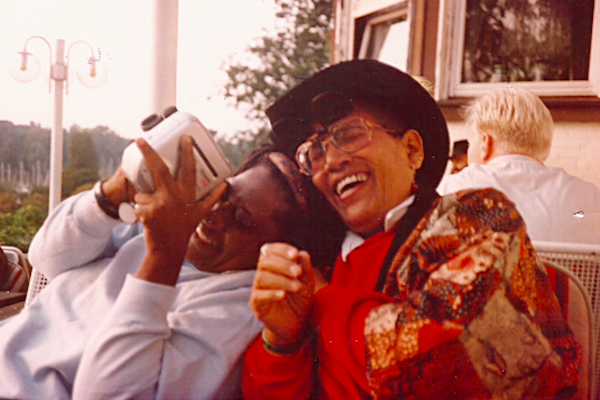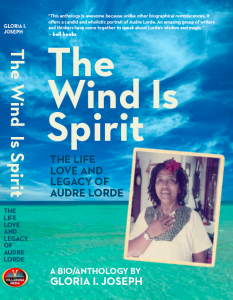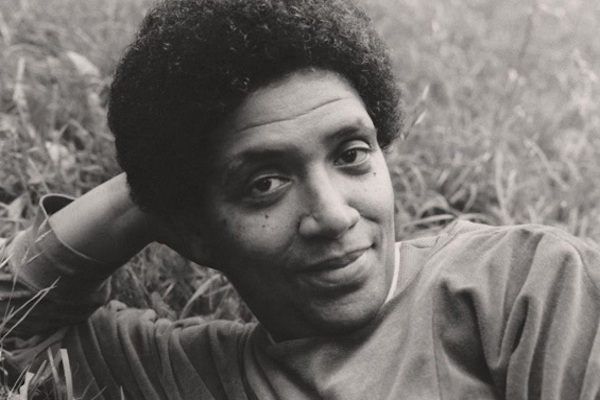An interview with Lorde’s partner Dr. Gloria Joseph
In honor of Black History Month and queer history, today on what would be her 82nd birthday, we want to honor Audre Lorde. The “black, lesbian, mother, warrior, poet” who was instrumental in the civil rights, gay rights and women’s movements and whose voice continues to inspire generations long after she is gone. Recently, Tagg got to speak with Dr. Gloria Joseph, Audre Lorde’s partner, about her life and Joseph’s upcoming book, The Wind Is Spirit: The Life, Love and Legacy of Audre Lorde. The work was recently published by Villarosa Media and though it is their inaugural book, Villarosa is a boutique publishing company focusing on African-American stories and the African diaspora.
The bio/anthology was born out of a promise that Joseph made to Lorde before her passing to tell Lorde’s full and complex story. The book is done in griot style and includes pictures, stories, and artifacts from many contributors in Lorde’s life.

Tagg: Thank you so much for taking the time to speak with me. It is an honor. I know the book is about Audre’s life and her being able to really tell her own story through you. Can you tell me a little about the birth of this idea and when she decided that she really wanted to start discussing her life with you so that you could tell her story?
Dr. Joseph: Well, you know, as I clearly spell out in the book and an interview I had with her prior to her death, we discuss the bio; that I was going to do her bio and I asked her, what does she want the bio to do and she spelled it out. So that’s how it came about. She herself said what she wanted this bio to do, you know? For other people to know her in all her highs and lows, but she didn’t use the words high and lows, but in all the complexities. That she wanted people to use her words and her work to make them—to enhance their lives, to put to good use her visions and her words, you know? But basically, that’s it.
Tagg: Can you tell me a little bit about what this book has that maybe people haven’t seen before? Or, haven’t been able to have access to?
Dr. Joseph: Yeah, well this book is quite different from others. You know, the reason I call it a bio/anthology is because that’s what it is. I wanted other people to—with their experiences with Audre, to be able to, in essence, create a profile. Honor her by their stories because it’s not possible to actually capture someone’s entirety. So I thought that the best way to do this would be to have a number of persons who knew her in different phases of her life and different encounters in different situations—if they tell their stories, then putting that together would create a more, what I consider a more, comprehensive picture of her.
 Tagg: I did see that there were a lot of contributors in this book. What kind of people, whether it be people we might know or just people who were important to her life, were contributors for this? What people’s stories are you using?
Tagg: I did see that there were a lot of contributors in this book. What kind of people, whether it be people we might know or just people who were important to her life, were contributors for this? What people’s stories are you using?
Dr. Joseph: Well see, actually, the people were selected from around different areas. Those who knew her from her writing, those who knew her from her beekeeping days, those who traveled with her, those who knew her as students, you know? Those are the areas that we used in order to select people.
So basically, back to your first question, in discussing a biography, what she said she really wanted, what she said she wants this biography to do, she said, “To leave the story of who I am and all my complexities. And to make the quality of my life so irresistible that other people will share my visions.”
So basically, that’s what she wants to do. And she said she wanted people to know that she did her best with what she had and she said it’s not a question of following, just a like poem. A poem doesn’t tell you how to act and how to feel, it inspires something inside of you. So that’s what she wanted to do, she wanted to inspire people… from inside of her.
Tagg: And what has this meant to you, to finally get [this book] out there?
Dr. Joseph: Well, that would have to be on two levels. You know, without question, it was going to get out there and it’s still an ongoing process because getting it out there is one thing but is it going to fulfill her wishes? Is it going to resonate with the world, with people? And I want people to see the philosophical aspects of her life and how much it created a sage and her African ancestral roots of spirituality comes through on so many of her poems. So hopefully it will be a classic and it will be projected to the realm that she so well deserved, for participating in three major movements, you know, civil rights, the gay and the women’s movement, and being influential in these and inspiring people, you know? You’ve got to see her in that dynamic role. So completing it is, of course the satisfaction is fulfilling but then it’s like I said, it’s ongoing, it doesn’t stop there. I had a draft out and complete and I sent it out to many publishers but there were rejections. Which I respected because they didn’t meet the qualifications that the publishers wanted.
So I just hope that generations to come will understand who this woman was. Because there are some younger people now who are not familiar with her work and it’s valuable work and they should be familiar. So I hope the book, that’s one thing I hope it does, inspires and encourages younger generations and shows how much she did with what she had.
Tagg: I know that you can’t really specifically speak for her, but there are so many things going on in the world and The United States, and I know that you’re in St. Croix for the most part, but if she were alive today, what do you think she would be passionate about? Like what movements or what things in the world going on?
Dr. Joseph: Nothing more than the expansion of the things that she was already interested in because a lot of these things haven’t changed. Those who are oppressed, maybe Black Lives Matter, she would have been supportive of that. You know, because her interests and her passions wouldn’t have changed. She’d just have to take a different perspective on them. How does she feel about this? How does she always feel about the disenfranchised? How does she feel about racism? How does she feel about sexism? She would be fighting the battles that the progressive people are still fighting now because we still have to deal with all of these things. She would be passionate about all these things that she’s always been. Oppression, racism, sexism, the whole liberation movement, and certainly the immigration movement. You have to understand, she could pretty much project her thinking about those who were, I guess mistreated isn’t necessarily the word, but those who were really oppressed. They’re fighting those battles for the same reasons, you know, but they have a different perspective on it and different techniques.
Tagg: Definitely. And is there anything else you would like to add about the book or about touring?
Dr. Joseph: You know, I just hope that people are able, and they should be able, to see her in a realm, a broader realm outside of those, about seven ways she described herself. But to show her poetic genius, her wisdom, her ability to interact and give meaning to the lives of so many people in so many different lifestyles, you know? Assata Shakur, Angela Davis, Adrienne Rich, Jewelle Gomez, everyone who cared for her. All of these people in such a breadth and range of people who she gave meaning to and who meant something to her.
Tagg: Well, like I said, I am very much looking forward to getting my hands on it and to be able to look through all of these different stories and to get a better grasp of who she was as a whole person.
Dr. Joseph: That’s exactly right. That’s what it should—I hope that’s what it does. You’ll have to let me know after you read it.
Tagg: I absolutely will.
Dr. Gloria Joseph will be touring for the upcoming launch and celebration of The Wind Is Spirit: The Life, Love and Legacy of Audre Lorde.


